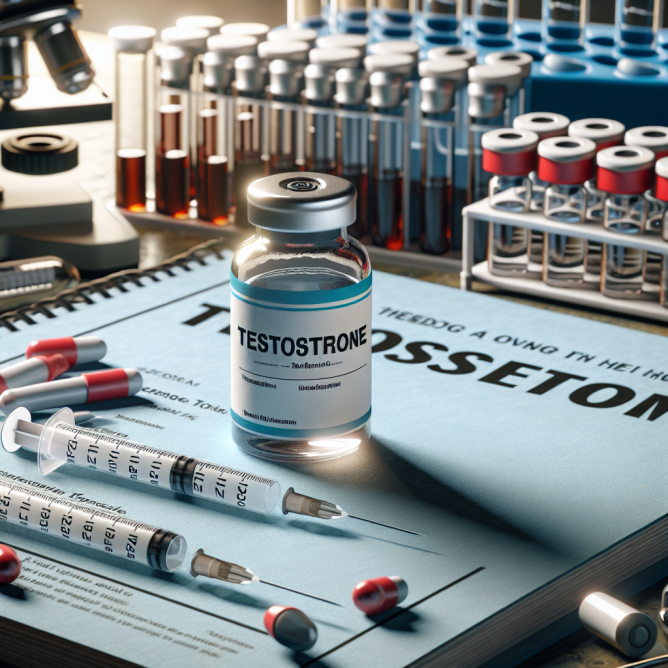HRT Testosterone: Understanding the Benefits and Risks
Introduction:
Hormone replacement therapy (HRT) is a medical treatment that involves the use of hormones to replace those that the body is no longer producing in sufficient quantities. Testosterone is a hormone that is primarily associated with men, but women also produce small amounts of it. HRT testosterone is a form of therapy that involves the use of testosterone to treat conditions such as low testosterone levels, menopause, and andropause. In this article, we will explore the benefits and risks of HRT testosterone, as well as the factors that should be considered before starting this type of therapy.
Benefits of HRT Testosterone:
1. Increased Energy and Vitality:

One of the most significant benefits of HRT testosterone is an increase in energy and vitality. Testosterone is a hormone that is responsible for providing the body with energy and motivation. When testosterone levels are low, individuals may experience fatigue, low energy, and a lack of motivation. HRT testosterone can help to restore these levels, leading to an increase in energy and vitality.
2. Improved Mood and Cognitive Function:
Testosterone is also associated with improved mood and cognitive function. Low testosterone levels have been linked to depression, anxiety, and cognitive decline. HRT testosterone can help to restore these levels, leading to an improvement in mood and cognitive function.
3. Increased Muscle Mass and Strength:
Testosterone is a hormone that is essential for muscle growth and strength. When testosterone levels are low, individuals may experience a decrease in muscle mass and strength. HRT testosterone can help to restore these levels, leading to an increase in muscle mass and strength.

4. Improved Bone Density:
Testosterone is also essential for maintaining bone density. Low testosterone levels have been linked to osteoporosis, a condition characterized by weak and brittle bones. HRT testosterone can help to restore these levels, leading to an improvement in bone density.
Risks of HRT Testosterone:
1. Increased Risk of Prostate Cancer:
One of the most significant risks associated with HRT testosterone is an increased risk of prostate cancer. Testosterone is a hormone that can stimulate the growth of prostate cells, which can lead to the development of prostate cancer. Individuals who are at an increased risk of prostate cancer, such as those with a family history of the disease, should discuss the risks and benefits of HRT testosterone with their healthcare provider.
2. Increased Risk of Cardiovascular Disease:
Another risk associated with HRT testosterone is an increased risk of cardiovascular disease. Testosterone can increase the levels of low-density lipoprotein (LDL) cholesterol, also known as “bad” cholesterol, which can lead to the buildup of plaque in the arteries and an increased risk of heart disease. Individuals who are at an increased risk of cardiovascular disease, such as those with a family history of the disease, should discuss the risks and benefits of HRT testosterone with their healthcare provider.
3. Increased Risk of Blood Clots:
Testosterone can also increase the risk of blood clots. Testosterone can increase the levels of fibrinogen, a protein that is involved in the formation of blood clots. Individuals who are at an increased risk of blood clots, such as those with a family history of the disease, should discuss the risks and benefits of HRT testosterone with their healthcare provider.
Factors to Consider Before Starting HRT Testosterone:
1. Age:
Individuals who are over the age of 65 may be at an increased risk of adverse effects from HRT testosterone. This is because older individuals may have a decreased ability to metabolize testosterone, which can lead to an increased risk of adverse effects.
2. Medical History:
Individuals who have a history of prostate cancer, cardiovascular disease, or blood clots should discuss the risks and benefits of HRT testosterone with their healthcare provider. This is because these individuals may be at an increased risk of adverse effects from HRT testosterone.
3. Lifestyle:
Individuals who have a sedentary lifestyle or who smoke may be at an increased risk of adverse effects from HRT testosterone. This is because these individuals may have a decreased ability to metabolize testosterone, which can lead to an increased risk of adverse effects.
Conclusion:
HRT testosterone is a form of therapy that involves the use of testosterone to treat conditions such as low testosterone levels, menopause, and andropause. While HRT testosterone can provide significant benefits, such as increased energy and vitality, improved mood and cognitive function, increased muscle mass and strength, and improved bone density, it also carries significant risks, such as an increased risk of prostate cancer, cardiovascular disease, and blood clots. Individuals who are considering HRT testosterone should discuss the risks and benefits of this therapy with their healthcare provider and consider factors such as age, medical history, and lifestyle. By doing so, individuals can make an informed decision about whether HRT testosterone is the right choice for them.

